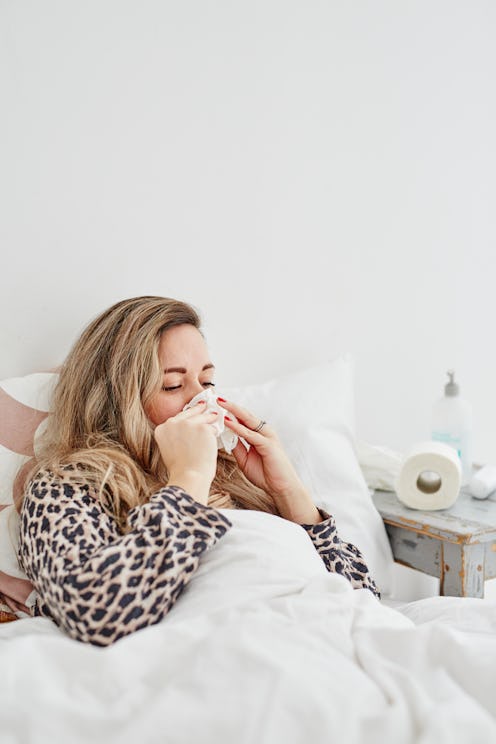Health
What To Know If You Get Sick Before Your Flu Shot Appointment
Reschedule for when you’re feeling 100%.

Autumn means it's time for pumpkin spiced everything, russet-colored apples, and scheduling your flu vaccine. But what should you do if you diligently make the appointment, get your mask in order, and then wake up on the morning with a fever? It's important to know the facts about the flu shot, including things like whether you should get the flu shot if you're sick.
"It's important to get the flu shot this year," Dr. Julia Blank M.D., a family medicine physician at Providence Saint John's Health Center, tells Bustle. Getting the flu vaccine will help reduce the risk that you'll be hospitalized with flu-related problems, freeing up resources for a potential surge of COVID-19 patients this winter. You'll also reduce your risk of getting co-infected with flu and COVID-19 at the same time — which is unlikely, but can still happen (and would really suck).
When it comes to getting the flu shot while you're sick, your choices depend on your symptoms, doctors say. The Centers for Disease Control and Prevention (CDC) recommends everyone six months and older receive an annual influenza vaccine. But they also state that people who currently have a moderate-to-severe illness with or without a fever should wait until they recover to get vaccinated.
There are a couple of reasons for this. "You should not get a flu shot if you have a fever or are severely ill, as this may prolong your recovery and blunt your body’s immune response to the flu vaccine," Dr. Blank says. The flu vaccine prompts your immune system to develop antibodies to fight off the influenza virus. If you're already sick, your immune system is already hard at work fighting off your current illness. You're just giving it more to do, and it might not be able to do both jobs as effectively. It could be harder for your body to develop the antibodies against the flu, or it could end up making it harder for your body to fight against your present illness. It's also easy to confuse the symptoms of a more severe illness with side effects from the vaccine, which could be frustrating and lead to you treating the effects the wrong way — trying to sweat out a fever rather than seeking medical help, for instance.
Either way, it's not ideal. You don't want to get a flu shot just to still get the flu later on — that's literally the opposite of what you're going for. And you don't want to make your recovery time of your current illness longer, because that's just uncomfortable.
The main signal that you should postpone your flu shot, experts say, is a fever. If you have no fever but are ill enough that you've called out of work, or are contemplating going to see your doctor or the E.R., you shouldn't go in either. If in doubt, call the doctor; they'll be able to give guidance about whether it's safe.
The flu shot won't raise your risk of getting COVID-19, but if you have symptoms of the coronavirus, like a fever, cough, or shortness of breath, you should cancel your flu vaccine and get a COVID-19 test. You don't want to expose the person giving you the flu jab to potential COVID-19 infection. You can reschedule after your test comes back negative, or after 10 days of isolation if your symptoms have improved and you don't have a fever.
While doctors recommend not getting the flu shot if you're very sick or if you have a fever, they agree it's probably fine to go through with it if you have a simple cold. "A mild illness such as a cold shouldn’t get in the way," Dr. Blank says. The only time you should really reschedule it is if your symptoms are more severe, or if COVID-19 might be the culprit.
Expert:
Dr. Julia Blank M.D.
This article was originally published on